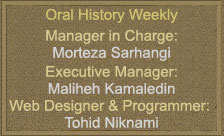| No. 407 | 6 August 2019 |
Few Tips on Oral History InterviewingHistory is collective incidents, events and past experiences, and the fate of each individual depends on it. Hence, this fundamental fact must be taken into account when collecting, recording and narrating it in various forms (written, non-written). The collective might be small (family, family, city, region) or large (ethnicity, race, nation, country). Thus, the term history embodies the meaning of the group and is the opposite of the individual and the individuality.Relation of "Community of Memory" and HistoryOral history in Iran is based on two models of compilation; either an interview is fully implemented and is committed on paper, or it is formed by the editor with his or her taste in form of narrative. Many works have also been published in these forms so far. But in our country, there is one aspect of oral history that has been concealed and it is methodological aspect.Rainy Travel Log (VII)I would say that, as you know, we had opportunity in sacred defense for theater, song, painting, murals, etc., but now because of the difficulties they are, no body have any motivation in cooperation, because they endure the critical conditions, and they are in hard situation. Sometimes they take an oppositional position; they do not like to be taken a photo or film. The best thing now is to play a movie and perform the hymns, ...The 304th session of "Night of Memoreis"-1FROM CAPTIVITY TO BITTER DAYAccording to the Iranian Oral History website, the 304th ‘Night of Memorials of Holy Defense’ event was held on Thursday, July 25, 2019 at the Sureh Hall of the Hozeh Honari. In this meeting, Bakhshali Alizadeh, Ibrahim Khodabandeh and Mohammad Mosaheb, related some of their memories of Mujahidin Khalq Organization and Mersad Operation. Bakhshali Alizadeh was the first narrator. ‘I was captured by the Baathist forces in the Musian zone at the ... Oral History Weekly Magazine Aims and Regulations
Oral History Weekly Magazine wishes to create a suitable place for thoughts and idea development; Its main field would be “Oral History” and subjects as telling & writing memoirs, writing diaries, travelogues, chronologies, and all other subfields of history which are presented in the form of news, articles, reports, notes, interviews and memoirs can be included. There is no limitation on the length of would-be-sent materials. Mentioning the name, academic background and email is necessary. Articles with complete references and bibliography are more credited and an abstract would quite helpful. Weekly is not about to publish any material consisting insults and libels about other people or anything that brings anxiety to public opinion. Weekly can edit and translate the received materials. The published articles and materials are only the writer’s ideas and Oral History Weekly Magazine has no responsibility about their content. |
 Thirsty Sands (Part 5) Jafar Rabiei Design: Ali Vaziri First published in 1991 Publishing House, Islamic Propagation Organization Printed at the Aryan
I only realized that they had been surprised at my being alive and, shouting and yelling, called other soldiers. All of them came along and surrounded me. The second time I opened my eyes. I realized they were Iraqi troops. The pain of wounds and thirst on the one hand and seeing the Iraqis on the other, made me forget my pain.    |
